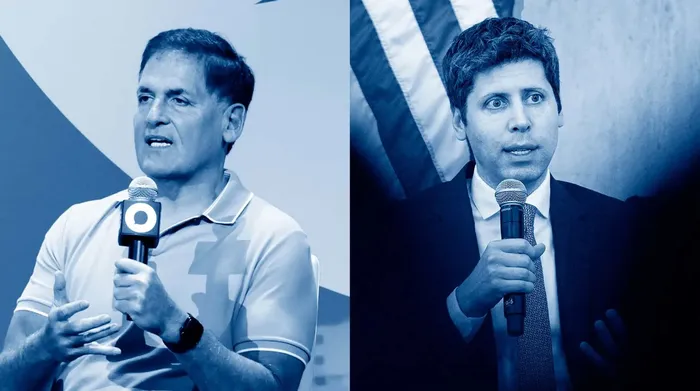
Mark Cuban and Sam Altman.
Image: Getty Images
OpenAI CEO Sam Altman isn’t shy about discussing the future of AI. As the CEO of a market leading company, his predictions carry plenty of weight, such as his worry that AI could make things go “horribly wrong,” or that AI agents will completely transform the workplace. Nor is billionaire Mark Cuban, who also sees vast changes to an AI-dominated workplace.
Altman’s recent remarks to finance executives at a Federal Reserve conference on large banks and capital requirements included his belief that entire job categories will be eaten up by AI. He said customer service is all but completely ready for an AI takeover right now, as reported by the Guardian newspaper.
“That’s a category where I just say, you know what, when you call customer support, you’re on target and AI, and that’s fine,” he said. When a user calls a hotline now, AI answers, and it’s like “a super-smart, capable person,” Altman explained, adding that “there’s no phone tree, there’s no transfers. It can do everything that any customer support agent at that company could do. It does not make mistakes. It’s very quick. You call once, the thing just happens, it’s done.”
You may have already encountered an AI customer service system, or at the very least spoken briefly to one before being forwarded to a person with the info you’re seeking. And anecdotally, if Altman’s promise of no mistakes proves true, then that’s a huge sell for customer service departments—and consumer satisfaction. (We all know how frustrating it can be calling these lines.) What an AI can offer under these circumstances is also clearly defined: customers probably call with a discrete set of common issues, and the AI can be trained on what to do.
But the next industry Altman said was ripe for an AI takeover is more complex, requiring deep knowledge and empathy, and there are much higher stakes at play. According to the AI CEO, AI is already better than human doctors. It can, “most of the time,” surpass human physician skills, he argued, suggesting it’s “a better diagnostician than most doctors in the world.” But then he pointed out a very human truth: “people still go to doctors,” he said, and he added that he felt the same, “maybe I’m a dinosaur here, but I really do not want to, like, entrust my medical fate to ChatGPT with no human doctor in the loop.”
That at least aligns with warnings from medical experts who say that while AI may be useful for medical advice under some circumstances, like helping to make medical notes, it’s just too subject to misinformation errors to be trusted to give mental health advice or diagnoses, for example. In fact a group of therapists recently warned of the danger in doing so.
Altman also told the bankers that he’s worried near future AIs could be used by bad actors, perhaps based overseas, to attack the U.S. financial system. He cited the issue of AI voice clones as a direct risk. While he’s not predicting AI will steal banking jobs here, he is essentially warning that the entire industry could be upended by AI, used the wrong way.
You may think Altman is being unnecessarily doomy here. In this case, you may be more aligned with the thinking of billionaire entrepreneur Mark Cuban. He’s just suggested that in his expert mind, AI will become a “baseline” workplace skill inside five years. Essentially he thinks that “like email or Excel,” everyone, from fresh graduates to practiced entrepreneurs, will have to master AI to succeed at their tasks.
in an interview with Fortune, Cuban predicted that thanks to the force multiplying effects AI can have, “we’ll see more people working for themselves” thanks to the rise of AI assistants, possibly powered by agent AI tech, which can transform “solo founders into full teams.” And worse, if you’re note already using AI to “move faster or make smarter decisions, you’re behind,” he said.
While framed more positively than Altman’s statements, a closer look says Cuban is still predicting whole classes of jobs will disappear inside five years. Why would a startup CEO need a personal assistant, a coding expert or a marketing adviser if all those tasks could be done by next-gen AI?
All of this, while interesting, could be dismissed as mere PR for the AI industry, but you should actually care about this expert advice.
Altman’s warnings could have you looking at what tasks you already feel comfortable outsourcing to an AI tool instead of a human worker. And then, taking Cuban’s advice, you should consider taking time to properly educate yourself about the promises and risks of AI technology, and also plan on upskilling or reskilling your existing staff. The potential efficiencies AI promises mean they could
— By Kit Eaton
This article originally appeared on Fast Company‘s sister publication, Inc.
Inc. is the voice of the American entrepreneur. We inspire, inform, and document the most fascinating people in business: the risk-takers, the innovators, and the ultra-driven go-getters that represent the most dynamic force in the American economy.
